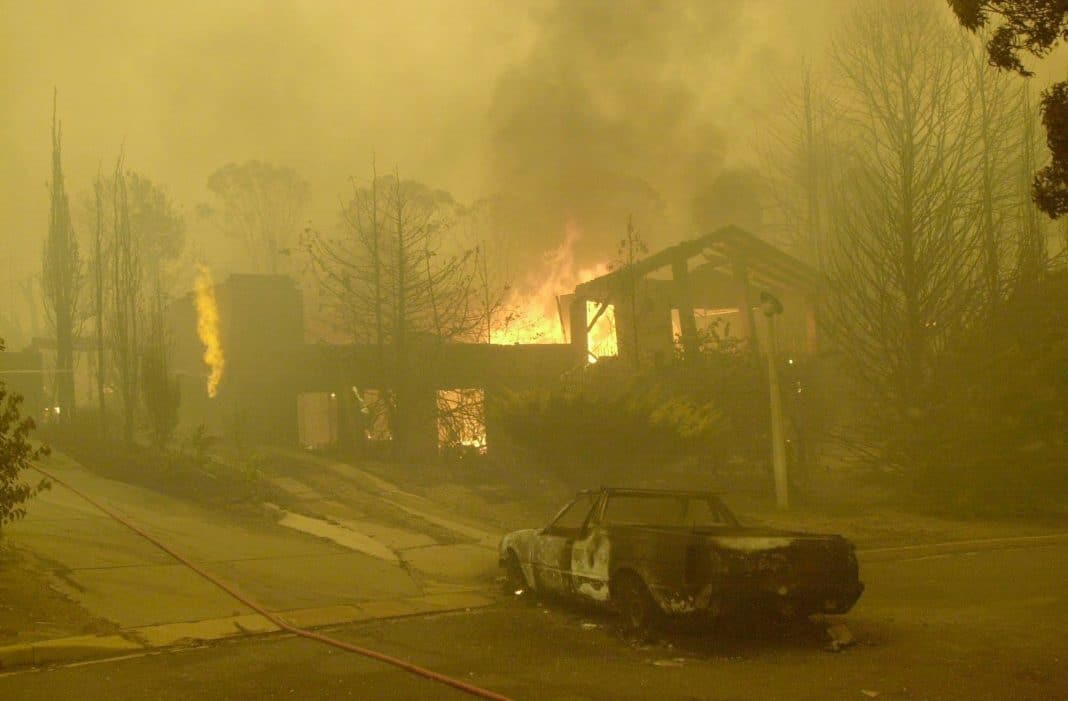This week, 18 January, marks 20 years since the worst bushfires in Canberra’s history killed four people, destroyed hundreds of homes and blackened most of the territory’s surrounding bush and farmland.
In early January 2003, lightning strikes caused multiple bushfires to break out in the drought-stricken national parks close to the city.
The flames were not contained, and by January 18, the fire fronts merged and weather conditions deteriorated to create the world’s first documented fire tornado, which swept into the city and surrounds.
The fires killed four and injured more than 400, with thousands forced to evacuate.
Even after two decades, the horrific fire remains etched in Canberra’s collective memory.
Victims of the fires will gather for a public commemorative event at the Stromlo Forest Park Bushfire Memorial on January 18 to remember those who lost their lives.
ACT Rural Fire Service chief officer Rohan Scott was a volunteer with the local brigade at the time and says this time of year evoked a range of emotions.
“I didn’t really realise it at the time, but it has affected me as the years have gone on,” he told AAP.
While tragic, Mr Scott said the event had spurred a nation-leading approach to fire response and management.
“I don’t think we can say it will never happen again, but hopefully, we won’t see the significant devastation as in the 500-plus houses that we had back in ’03.”
The event sparked a series of inquiries that found emergency services authorities had failed to do enough to put out the fires when they first started.
Investigations also uncovered a failure to provide the community with enough warning.
Mr Scott said the ACT government had learned from its mistakes.
“We’ve got better planning, better community messaging, better resourcing and technology for the fire services and our response, better equipment and training and welfare options for our staff and volunteers,” he said.
However, a January 2023 ACT Multi-Hazard Advisory Council report found the territory had more to do to protect the community.
It found there were few practical actions taken to combat higher bushfire risks due to climate change and called for a more strategic, whole-of-government approach to the problem.
Mr Scott said the government had acknowledged the report but was yet to formally respond.
“But from a service perspective and the territory’s perspective, we’ve had significant changes in the 20 years since those fires.”
University of Canberra expert Barbara Norman agreed that lessons had been learned from the devastating 2003 fires.
Professor Norman, who is an expert in how cities can adapt to bushfires and other climate risks, said the ACT was on the front foot when it came to preparing Canberra for bushfire risks, with the government going to great lengths to avoid putting people and property in harm’s way.
For example, planners are now considering if high-risk bushfire zones are suitable for housing or should be reserved for lower-risk recreational sites.
The bushfire anniversary comes at a time when fire threats have been superseded by heavy rains and destructive floods, but risks remain.
In fact, above-average rainfall has turbocharged vegetation growth, which means there’s ample ground fuel for fires if warmer and drier weather starts to dry out the landscape.
Mr Scott said his staff and volunteers were most concerned about grass fires this summer and were preparing for drier periods now that the La Nina weather pattern, which brings rain, is easing.
“We go through the wet periods and we move into a cycle of dry and drought periods with the Australian climate,” he said.
But the periods between dry and wet spells are becoming shorter.
Mr Scott recommended all ACT residents have a multi-hazard survival plan to ensure everyone knows how to keep safe in the event of a bushfire or another disaster.
“We do need to understand that the climate is changing – we’re not just experiencing more severe fire seasons but we’re also getting severe storm seasons as well.
“So it’s really important to have that multi-hazards approach.”
By Poppy Johnston in Canberra



